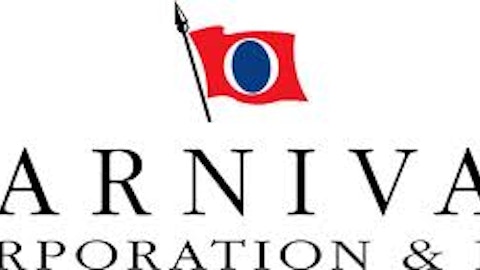Carnival Corporation (NYSE:CCL) dropped nearly 2% on March 15 due to its disappointing 2013 outlook. The company expects to earn around $1.80 to $2.10 per share for the year, while analysts expected EPS to be around $2.35. Since the beginning of February, the stock has declined by around 12%, from around $39 per share to nearly $35 per share. Should we avoid Carnival due to its poor outlook? Let’s find out.

Fluctuating bottom line and free cash flow
Carnival Corporation (NYSE:CCL), incorporated in 1972 in Panama, is considered to be the biggest cruise company globally, with around 100 cruise ships and a portfolio of many world famous cruise brands. The majority of its cruise, around 33% of the total passenger capacity deployed, were in the Caribbean. The European region ranked second, accounting for 31% of the total passenger capacity in 2013.
In the past ten years, Carnival’s revenue has been on the rise, from $6.7 billion in 2003 to $15.4 billion in 2012. However, net income has fluctuated in the range of $1.19 billion – $2.4 billion during the same period. In 2003, it earned $1.66 per share, while the EPS was only $1.67 in 2012. Indeed, over the years, Carnival’s net margin has experienced a decline, from 17.77% in 2003 to only 8.44% in 2012.
In 2012, Carnival generated around $3 billion in operating cash flow and $667 million in free cash flow. What I like about Carnival is that the company does not employ a lot of debt in its operation. As of February 2013, it had $23.5 billion in total stockholders’ equity, $476 million in cash, and nearly $9.4 billion in short and long-term debt.
A decent first quarter
In the first quarter of 2013, Carnival Corporation (NYSE:CCL) reported that its GAAP net income was $37 million, or $0.05 per share. This included the net unrealized losses of $28 million on fuel derivatives. This quarter was an improvement compared to the loss of $139 million in the first quarter last year. A $139 million loss last year was due to a $173 million impairment charge on Ibero goodwill and trademark.
For the full year 2013, Carnival’s Chairman and CEO, Micky Arison, expected that its full year 2013 non-GAAP diluted EPS to be in the range of $1.80 – $2.10, compared to $1.88 per share in 2012. In addition, he estimated that Carnival would generate more than $3 billion in operating cash, and be committed to returning free cash flow to shareholders in 2013.
Highest dividend yield with reasonable valuation
At around $34 per share, Carnival Corporation (NYSE:CCL) is worth around $26 billion on the market. The market values Carnival at around 10.5 times EV/EBITDA. Compared to its peers, including Royal Caribbean Cruises (NYSE:RCL) and Norwegian Cruise Line Holdings Ltd (NASDAQ:NCLH), Carnival seems to be the best pick among the three.
Norwegian Cruise Line Holdings is trading at nearly $30 per share, with a total market cap of around $6.2 billion. It has the most expensive valuation at 15.7 times EV/EBITDA. Royal Caribbean, at nearly $33 per share, has around $7.1 billion in total market cap. It is valued at around 10.36 times EV/EBITDA.
Among the three, Norwegian Cruise Line Holdings is the most profitable company with an operating margin of 15.7%. The operating margin of Carnival ranked second at 12.1%, while Royal Caribbean’s operating margin was the lowest at 10.26%. Income investors might like Carnival the best with its highest dividend yield of 2.9%, while the dividend yield of Royal Caribbean is only 1.4%. NCL does not pay any dividends at the moment.
My Foolish take
Among the three, I would definitely go for Carnival Corporation (NYSE:CCL) for its highest dividend yield, reasonable valuation, and decent operating margin. However, the cruise business is not a good business to hold in a long run, as it would keep experiencing a fluctuating free cash flow in the future due to a high annual maintenance capital expenditure.
The article Should We Cruise on Carnival? originally appeared on Fool.com and is written by Anh HOANG.
Copyright © 1995 – 2013 The Motley Fool, LLC. All rights reserved. The Motley Fool has a disclosure policy.

